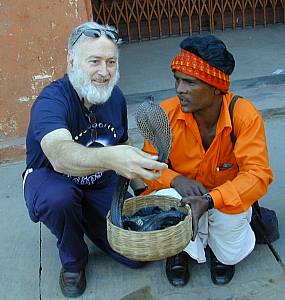Most trucks had a request to sound your horn because otherwise the driver didn't care what was behind.
Hanuman the monkey god stood along the road.
As we neared Jaipur we could see the scenery change.
There was no question that we were entering a desert region.
The Hawa Mahal is 5 storeys high but only one room thick.
It was built to allow the ladies of Sawai Pratap Singh's harem to watch the street scenes and processions without being noticed.
Right across the street was this snake charmer with his cobra.
Neither seemed to mind when I held it.

Amber Fort is an imposing feature outside of Jaipur.
As we arrived we saw this line of elephants waiting to carry tourists up the cobblestone road to the fort.
We watched as they walked to the loading platform facing the road to the fort.
Our elephant faced the other way, maybe he wanted to go home.
The mahout's name was Kaycee, the elephant was Pinkie.
The gates on the road are too narrow for our line of elephant to go through while others are descending.
With them crowding into the gate from both directions we were amazed to see a man and boy a motorcycle come popping out from between them.
From the fort you can see the Kesar Kyara Bagh with its gardens by Sager lake that provided water to the fort.
This gateway separates two sections of the fort.
The elephant headed god Ganesh welcomes us from his vantage point above the entrance.
Other views in the fort.
Sheesh Mahal is a hall in the fort covered with thousands of mirrors.
We were told that the light of a single candle would shine like stars from the curved mirrors in the ceiling and walls.
In the City Palace Museum we saw the Welcome Palace with its remarkable carved stone walls and entrance.
This silver urn, one of a pair, was used to transport Ganges water to London for Madho Singh II's visit in 1901.
Our guide told us that they are the largest silver vessels in the world.
Another stop was a shop where we got to print fabric using wooden block stamps.
Don said "Hands of a surgeon.", which he is, as he hammered the block with his fist.
And yet another demonstration of rug making.
Another form of transportation we used was the bicycle rickshaw.
If you have the opportunity to try this make sure that the "motor" is in good condition.
A milk distributor and other sights along the streets
Lakshimi Narayan Temple
Albert Hall combines elements of European and Indian architecture.
The astronomical observatory Jantar Mantar is one of several in India.
They were built during the early 1700's by Sawaii Jai Singh
This one has the largest sundial in the world with a gnomon that is 90 feet high as well as others of a variety of designs.
The hemispheres in the next two pictures have a representation of the sky turned upside down.
A small brass disk casts a shadow on the marble crescents showing moment by moment the azimuth and elevation of the sun.
The image of the disk can be seen on the white surface above the shadow of the man's hand.
An array of star dials were built to plot the positions of the twelve signs of the zodiac.
Each is inclined appropriately for the elevation of the ecliptic when its particular sign is highest in the sky.
A young magician put on a show on the bus.
Jaipur is known for the minerals that are found in the area.
Here are sapphire, ruby, and emerald, each about the size of a walnut.
Go to
our page about Delhi,
Agra,
Jaipur, Kathmandu,
Khokana,
Mount
Everest,
saris
Go to our Community page
Go to our Science Fun page
See
other places we have visited here.
Go to our Community page
Go to our Science Fun page